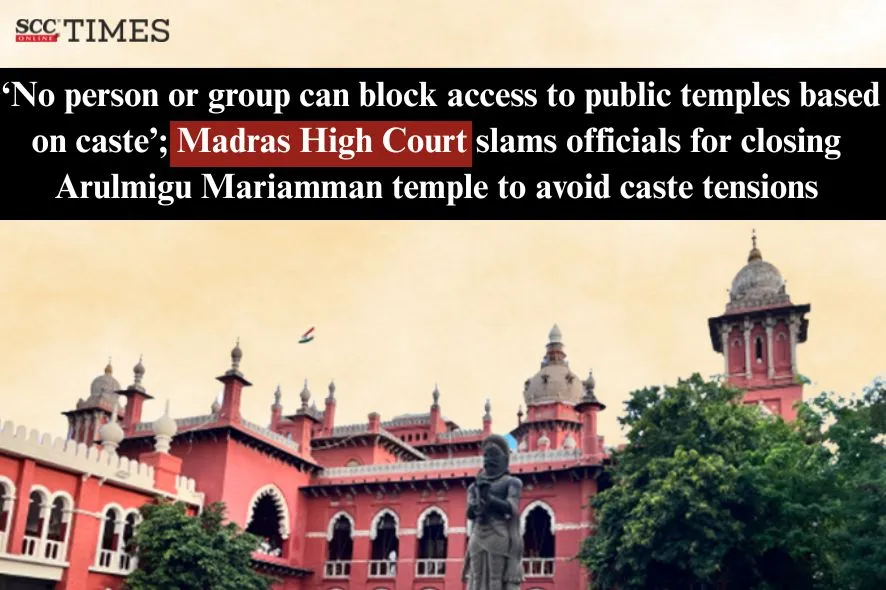Madras High Court: The case arose from two writ petitions concerning the Arulmigu Mariamman Temple at Chinna Dharapuram, Karur District. The first petitioner (Trust) sought resumption of worship and temple festivals, asserting there was no caste-based denial. While in the second petition, it was alleged that Scheduled Caste devotees were being denied entry into the temple. A Single Judge Bench of B.Pugalendhi, J., held that no person or group could block access to a public temple based on caste, and if anyone tried to create trouble or claim superiority based on caste, they would face strict legal consequences. The Court concluded that the right to worship could not be sacrificed for the sake of silence.
Background:
The Arulmigu Mariamman Temple at Chinna Dharapuram, Karur District had remained closed for all public worship and festival-related activities since 2018. The District Collector justified the prolonged closure citing apprehension of communal tension and the risk of law-and-order disturbances. The Trust claimed there was no caste discrimination and that they had been taking care of the temple for generations. On the contrary, the second petitioner alleged that the Scheduled Caste people were still not being allowed to worship, emphasising that this issue was not about management, but about basic access to the deity.
The Trust contended that they had been managing the temple from ancestral times, conducting poojas, paying electricity bills and staff salaries. They further alleged that the Scheduled Caste people were asking for management rights, not just the entry into the temple. However, an RTI reply from Hindu Religion & Charitable Endowments (‘HR & CE ’) Department clarified that the temple was under their control as per the Tamil Nadu Hindu Religion & Charitable Endowments Act, 1959 (the’1959 Act’). The Trust had also submitted a copy of a draft scheme dated 27-12-2023, issued by the Joint Commissioner of HR & CE, which proposed the appointment of a non-hereditary trustee from their side and invited objections from the public.
Analysis and Decision:
The Court strongly condemned the indefinite closure of a public temple, not for days or weeks, but for years, and called it a dereliction of constitutional duty. The Court expressed that the District Collector, as the top officer of the District, must not absolve himself from his duty by citing vague threats, and that it was his responsibility to handle the situation using the State machinery. Further, the Court criticised the District Police for believing that denying entry to everyone was the only way to maintain peace. The Court firmly remarked that the law must not equate the oppressor and the oppressed.
The Court criticised that even after 75 years of independence, people were still being kept out of temples because of their caste. The Court further emphasised that the Constitution of India did not permit discrimination among devotees, as God did not belong to any one caste, nor does he discriminate, only human beings do.
The Court questioned that if the Trust truly believed there was no discrimination, then why was anyone prevented from entering the temple. The Court noted that the simplest way to support their claim would have been to allow joint worship under official supervision, which would have respected everyone’s rights and proved the Trust’s position. Further, the Court observed that merely because the Trust had been managing the temple since ancestral times, it did not give them any legal control under the 1959 Act, since only the HR & CE Department had the power to decide who should manage a public temple, and even that must be done by following the proper procedures.
The Court examined the reports of the Collector, which confirmed that the temple was a public temple under the HR & CE Department, and the Trust had no official right to claim full control at this time. The Court pointed out that, if they wanted such a right, they should approach the appropriate authority under the HR & CE Act, and until then, they could not act as if they own the temple.
The Court referred to the Kandadevi Temple festival in Sivagangai District, held in 2024 (reopened after 17 years of caste conflict), wherein the present Government took proactive steps, used enough police force, spoke with all communities, and ensured peaceful participation, including Scheduled Caste devotees. The Court noted that it was the duty of the HR & CE Department and the State to make sure that everyone was allowed to worship, and that there was no caste-based exclusion.
The Court, therefore, directed the HR & CE Department to file a detailed report within two weeks, and the District Collector, Karur, to submit an affidavit explaining the reasons behind the temple’s closure since the year 2018, and why no steps were taken to allow joint worship with police protection. Furthermore, the Superintendent of Police was ordered to file a report about the update of the current law and order situation and assess whether adequate force could be deployed for joint worship.
Additionally, the Court clarified that no person or group could block access to a public temple based on caste and, anyone causing trouble or claiming caste superiority would face strict legal consequences, as the right to worship could not be sacrificed for silence.
The Court listed the matter after three weeks for further hearing.
[Vanniyakulachathiriyar Nala Arakattalai v. District Collector, Karur, 2025 SCC OnLine Mad 3500, decided on 15-7-2025]
Advocates who appeared in this case:
For the Petitioners: R. Vidhya
For the Respondents: F. Deepak , Special Government Pleader, E. Antony Sahaya Prabahar , Additional Public Prosecutor, S. Gokulraj, S. S. Madhavan , Additional Government Pleader


